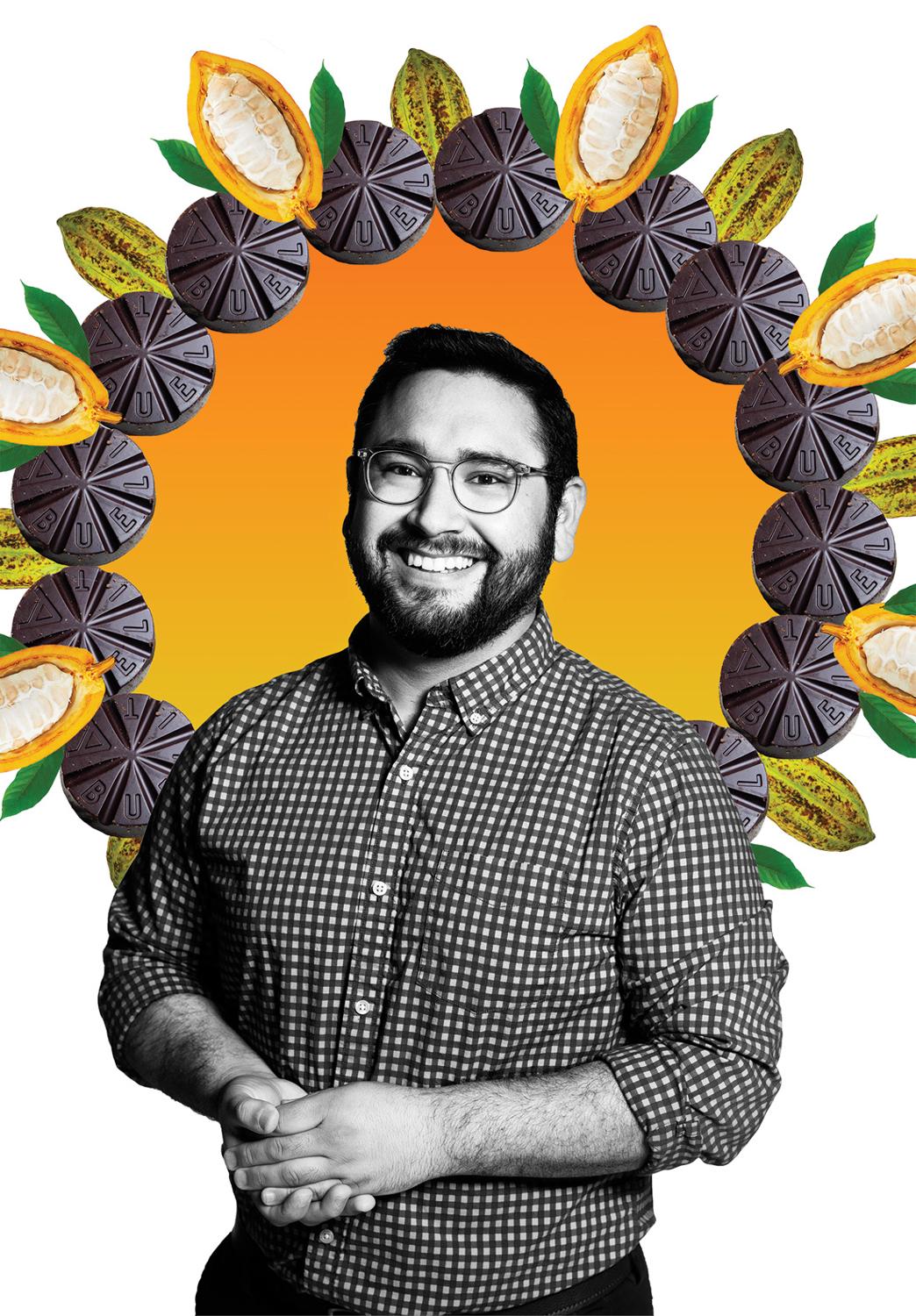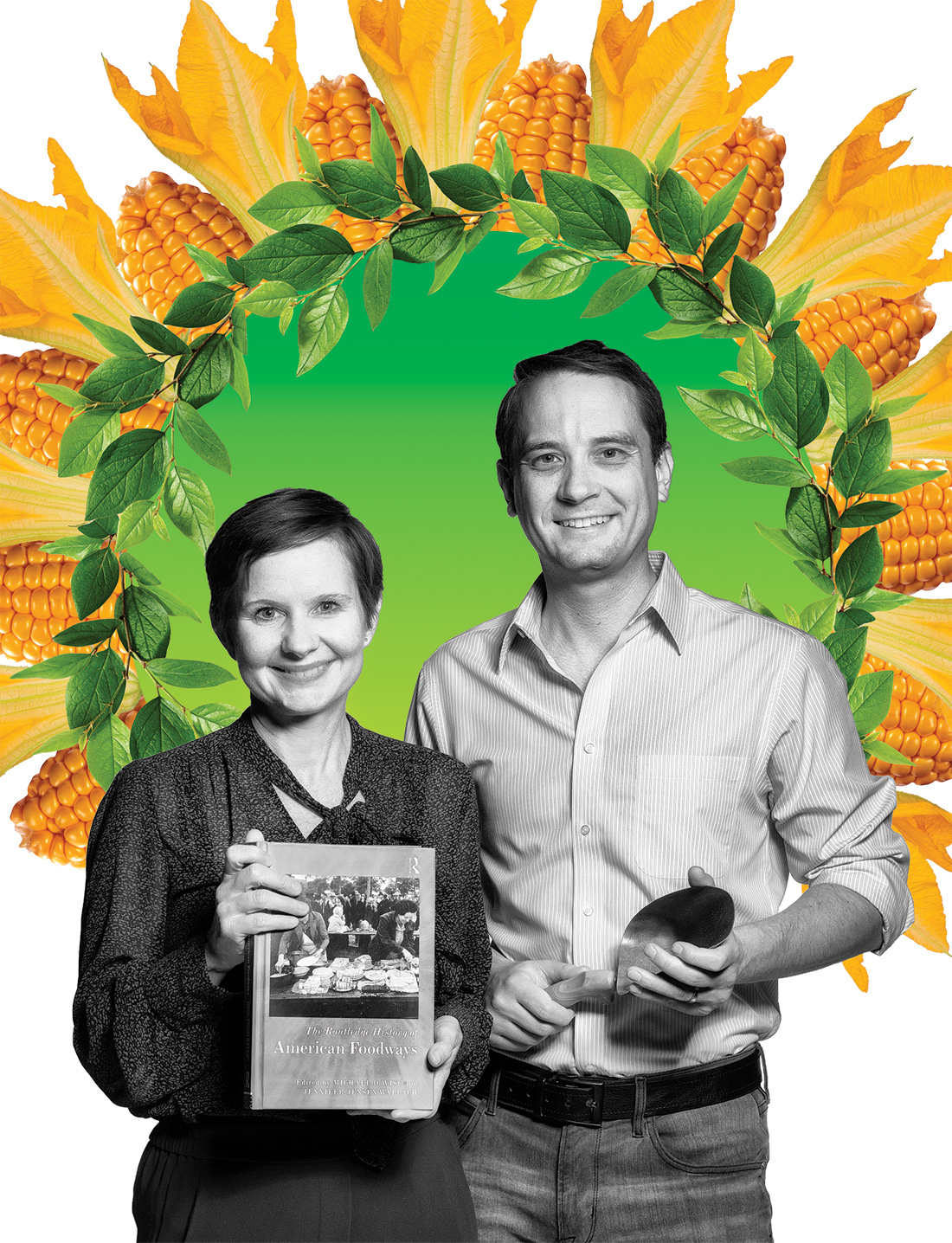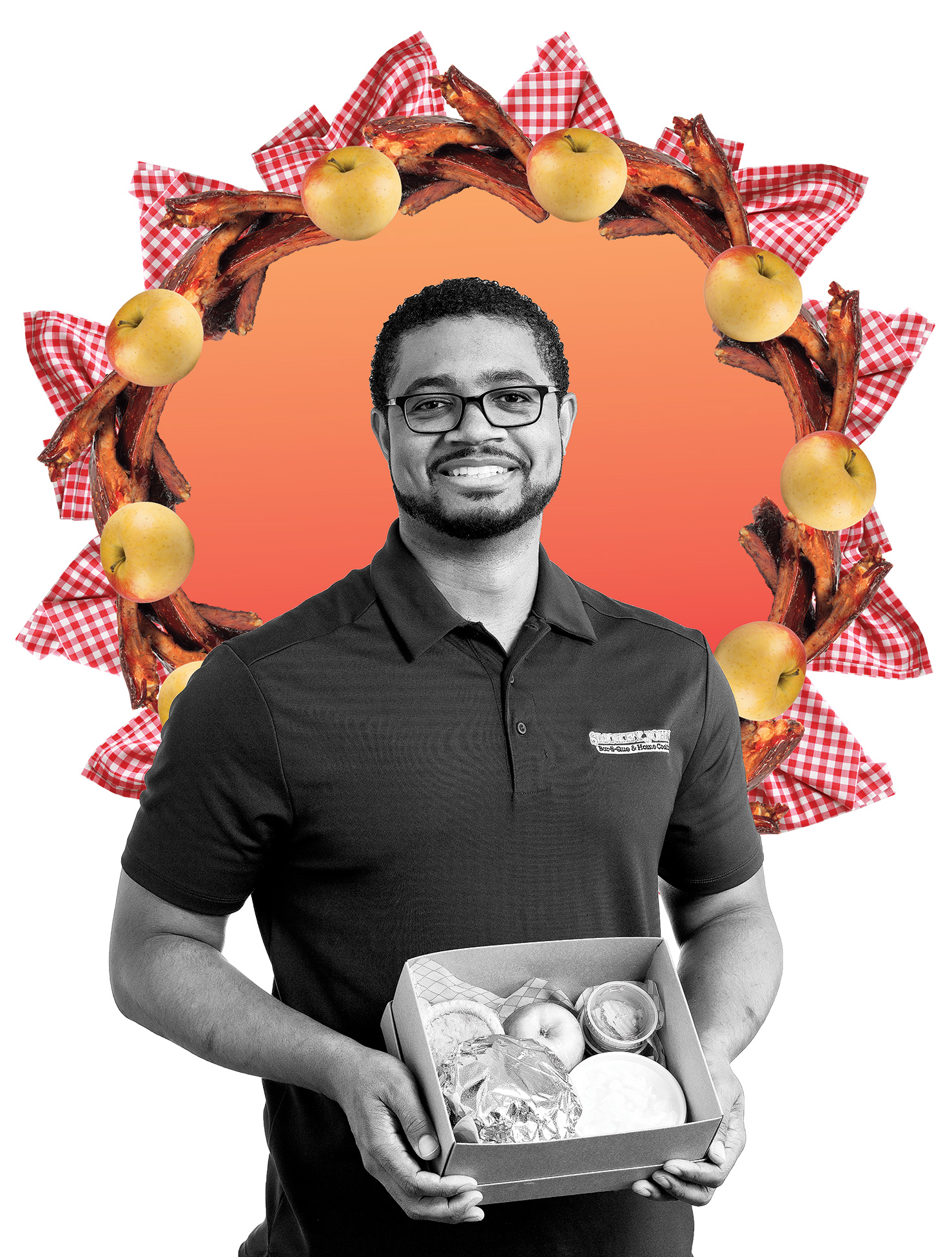Feeding the Mind
Anyone hungering to learn more about food can find a home for their curiosity at UNT.
Photography by: Ranjani Groth
March 27, 2020
Joshua Lopez was in high school when, while driving to pick up materials for a school project,
he told his mother he had a crush -- on a guy.

History doctoral student Joshua Lopez
His mother, Julie, stayed quiet as he came out to her as gay. When they arrived home, Lopez worked at the dining room table and could hear the banging of pots and pans and the flame of the stove from the kitchen. Then, Julie placed a cup of Mexican hot chocolate in front of him.
It wasn't until five years later that he realized the meaning of the beverage. Lopez's relationship with his mother had been awkward during that time but, as they stood at the grave of his grandmother, who died before he was born, he asked his mother to tell a story about her.
His mother said she never heard the words "I love you," but she felt them when Chavez made her Mexican hot chocolate.
"I connected with that drink and my family in a way I never had before," Lopez says.
Lopez believes these kinds of stories are an important part of history. As such, he's compiling oral histories from the Latinx and queer communities as a history doctoral student studying food history. And UNT's newly launched food studies program, encompassing many disciplines from history and biology to philosophy and hospitality and tourism, centers on how food affects the world -- through economics, food insecurity and race relations, among other topics.
It can be a great meeting ground for different types of people.
Joshua Lopez
This research is just one of the ways food has become a focused topic at UNT. The College of Merchandising, Hospitality and Tourism has developed several initiatives that launch students into careers in the food industry. UNT's fresh baked goods in Clark Hall Bakery, allergen-free dishes in West Hall and vegan options in Mean Greens all help the university stand out nationally as offering the campus the best, most innovative food options.
UNT's Department of History has taken a leading role in expanding the university's food-based curriculum. In 2018, the department rolled out a Body, Place and Identity concentration available to its doctoral students, and last year it launched an interdisciplinary food studies certificate for undergraduates. In 2019, the department also began offering a $5,000 graduate-level food history fellowship funded by the Julia Child Foundation for Gastronomy and the Culinary Arts.
"We use food to celebrate, to soothe ourselves, to build our identities and relationships, to create social boundaries," says history professor Jennifer Jensen Wallach. "We use it to survive."
Food across disciplines

History professors Jensen Wallach and Michael Wise
As the first recipient of the Julia Child Foundation for Gastronomy and Culinary Arts Fellowship in Food History, Lopez wants to bridge queer and food studies.
In addition to his oral history project, he's read up on other stories, such as LGBTQIA writers who came out as they were making food and a Chicana who, after she was diagnosed with cancer, changed her diet to reflect her indigenous ancestors.
"Food studies is very interdisciplinary," Lopez says. "It can be a great meeting ground for different types of people. "
The Body, Place and Identity concentration, for example, reconfigures traditionally historical scholarship by examining the history of the body and bodily practices, such as cooking and eating, that are significant but overlooked expressions of culture and identity.
"Because our approach powerfully unites cultural and environmental scholarship bearing on many of the pressing issues of the 21st century, UNT's leadership in food studies signals our emergence as a visionary research university," says history professor Michael Wise, an environmental historian of food and agriculture in modern North America.
Wallach and Wise, who are spearheading the university's expansion of food studies, have organized several projects such as presenting "Moral Cultures of Food: Past and Present," a conference on campus in 2015 that focused on current and historical food practices, as well as adopting one of the 20 plots in UNT's Community Garden near Legends Hall to create a History Garden. That project provided students with experiences in food planting and harvesting.
Other UNT history professors are studying food, from Rachel Moran's research on the history of nutrition and federal policies to Sandra Mendiola Garcia's research on food vendors in Mexico. Clark Pomerleau has explored the quest for food self-sufficiency of the "back-to-the-land movement," while Marilyn Morris has studied the body size of 18th century British royals. Nancy Stockdale is editing a book about the foodways of the Middle East, and Kate Imy has studied about food and the British Empire. Wallach has written three books focused on food history, including Getting What We Need Ourselves: How Food Has Shaped African American Life.
Professors from other departments also are exploring the many effects of food. Chetan Tiwari, professor of geography, and Edward Rincón, a Dallas-based research psychologist who is taking a special problems class with Tiwari, explored how supermarkets that do not build in poor urban areas -- often called "food deserts" -- could be making bigger profits, while also improving the overall health of the community, by establishing locations in those areas.
The challenge is ... to fashion food systemsand cultures that are equitable, sustainable
and resilient.
Michael Wise
And researchers in UNT's BioDiscovery Institute are making new discoveries in plant science that will lead to future breakthroughs in more sustainable crops such as wheat, corn and coffee to meet the market needs.
"We're fortunate to live in a world where food has never been more plentiful," Wise says. "But, our food systems face major threats from climate change as well as from social inequalities. The challenge is not simply to produce enough food, but to fashion food systems and cultures that are equitable, sustainable and resilient."
When it comes to preparing food or running a business in the industry, the College of Merchandising, Hospitality and Tourism has long been a leader in educating students.
"The global food business is roughly valued at $8 trillion," says Jana Hawley, the college's dean. "With our courses in nutrition, restaurant operations, food preparation, food safety and food retailing, UNT is a leader is preparing students in one of the world's most important commodities."
This fall, the college will offer a new class in food retailing with plans for a certificate in the field. This spring, the college launched The CoLab in Denton, which will host culinary events along with lectures, recitals and art exhibitions. And students learn how to cook in the Marriott Culinary Lab that models industrial kitchens.
The college also has paired up with Dining Services to work with the Menus of Change University Research Collaboration, a nationwide organization that promotes sustainability and social responsibility in the food service industries to bring healthy, sustainable foods to campuses around the country. Students also can immerse themselves in the restaurant business by working at the Club at Gateway on campus.
Bringing cultural context to cuisine

Brent Reaves ('99)
Brent Reaves ('99), a hotel and restaurant management major, worked in the restaurant back in the 1990s when it was at College Inn and says it prepared him to help run his family business, Smokey John's Bar-B-Que, in Dallas.
"We all had a chance to manage the whole machine of a restaurant," he says. "It was exactly the same high-pressure, high-energy experience that exists in the real world."
Reaves puts in 80 hours a week at the restaurant, which he runs with his brother Juan. Founded by their parents, the late "Smokey" John and Gloria Reaves, Smokey John's has been through some tough times, including a fire that destroyed the building in 2017.
But the business, which reopened a year later, maintained its presence thanks to the family's dedication and creative ideas. They frequently win awards at the State Fair of Texas, including the 2019 "best taste -- sweet" award for Big Red Chicken Bread, a doughnut infused with Big Red soda and paired with a fried chicken wing wearing sunglasses.
For Black History Month, the restaurant sold shoeboxes filled with barbecue, a side, fruit and pound cake, as a nod to when African American families ate their meals out of shoeboxes while traveling during the Jim Crow era because they were not allowed to eat in restaurants. Just like Joshua Lopez's hot chocolate connecting him to his family and his identity, the barbecue meals mean more than nourishment.
"Our hope is people hold onto the experience of eating our shoebox meal," Reaves says, "so that they never forget about that moment in history."
These experiences are what drives the university's creative efforts to help impact the world's collective future.
"We are a university on the forefront of thinking about food in eclectic and sophisticated ways," Wise says.